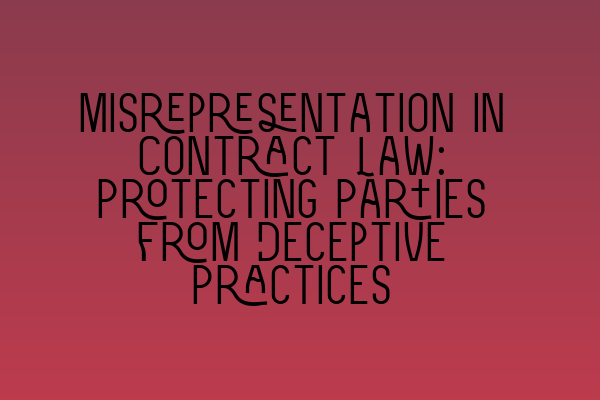Misrepresentation in Contract Law: Protecting Parties from Deceptive Practices
Contracts are the foundation of business and everyday transactions. They help ensure that parties fulfill their obligations and protect their rights. However, when one party engages in deceptive practices or provides false information during contract negotiations, it can lead to detrimental consequences for the other party. This is where misrepresentation in contract law comes into play.
In this article, we will explore the concept of misrepresentation in contract law, its types, the legal consequences, and how parties can protect themselves against deceptive practices. Let’s dive in!
What is Misrepresentation?
Misrepresentation occurs when one party makes false statements, conceals important information, or acts in a way that leads the other party to believe something false during contract negotiations. These false statements can be made verbally, in writing, or through conduct.
There are three main types of misrepresentation in contract law:
- Fraudulent Misrepresentation: This occurs when a party knowingly makes false statements or conceals information with the intent to deceive the other party. Fraudulent misrepresentation is a serious offense and can lead to severe legal consequences.
- Negligent Misrepresentation: Negligent misrepresentation happens when a party makes false statements without exercising reasonable care to ensure their accuracy. Although the intent to deceive may not be present, the party still bears responsibility for the consequences of their misrepresentation.
- Innocent Misrepresentation: Innocent misrepresentation occurs when a party unintentionally provides false information or makes false statements that they genuinely believe to be true. While there is no intention to deceive, the party is still responsible for any resulting damages.
Legal Consequences of Misrepresentation
When misrepresentation occurs in a contract, the innocent party has certain legal remedies available to them. They can:
- Rescind the contract: The innocent party can seek to cancel or void the contract, making it legally unenforceable.
- Claim damages: They may also claim compensation for any financial losses suffered due to the misrepresentation.
- Seek specific performance: In some cases, the innocent party can request that the court orders the other party to fulfill their original contractual obligations.
However, it’s essential to note that the course of action depends on the type of misrepresentation, the nature of the contract, and the specific circumstances of the case.
Protecting Against Misrepresentation
To protect themselves against the potential harm caused by misrepresentation, parties should take certain precautions during contract negotiations. Here are some key steps:
- Conduct Due Diligence: Before entering into a contract, thoroughly research and verify the information provided by the other party. This includes conducting background checks, verifying qualifications, and seeking references.
- Document Everything: Keep a comprehensive record of all communications, proposals, and representations made during the negotiation process. This can serve as evidence in case of a dispute.
- Seek Legal Advice: Consulting a solicitor who specializes in contract law can provide valuable guidance and ensure that your rights are protected throughout the negotiation and drafting phases.
- Include Protective Clauses: Consider including specific clauses in the contract that address misrepresentation, such as warranties and indemnity provisions. These can help clarify each party’s responsibilities and provide remedies in case of misrepresentation.
- Regularly Review Contracts: Periodically review and update contracts to ensure they remain comprehensive, accurate, and reflective of any changes in the business relationship.
By following these steps, parties can minimize the risk of falling victim to misrepresentation and protect their interests.
Conclusion
Misrepresentation in contract law is a serious issue that can lead to significant financial losses and legal consequences for the innocent party. Understanding the concept of misrepresentation, its types, and the legal remedies available is crucial for protecting oneself in contract negotiations.
If you found this article informative, you may also be interested in reading the following related articles:
- Exploring the Impact of Frustration on Contractual Obligations: Legal Insights
- Interpreting Contractual Clauses: Unlocking the Hidden Meanings
- Legal Aspects of Business Contracts: Key Considerations for Entrepreneurs
- Agreements in Contract Law: Understanding Its Various Types
- Essentials of Consideration: Understanding the Basis of Contractual Exchange
Remember, seeking legal advice from a solicitor specializing in contract law is essential to ensure that your rights are protected in contractual relationships. If you have any questions or need assistance, do not hesitate to reach out to SQE Contract Law.
